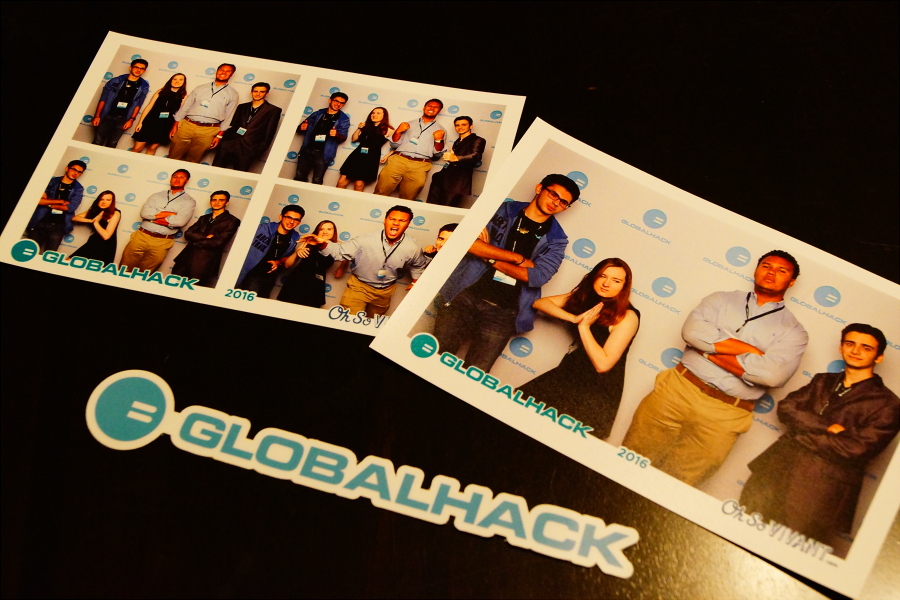After facing 55 hours allocated to programming, developing, designing and coding, junior Hannah Hoffmann and sophomore Michael Navazhylau reached semifinals in the sixth annual Globalhack competition.
The event, opening to participants on Oct. 21, challenged youth, college and pro division teams to code and implement software that could assist homeless shelters in management and organization.
“Homelessness is a global problem begging for a solution,” GlobalHack’s site read before the competition’s opening. “GlobalHack VI will work to solve this issue, by challenging teams to create software that helps agencies like the St. Patrick Center and other service providers better answer the question – how can we do more with less?”
Hoffmann and Navazhylau formed a youth team with two Parkway Central seniors, Leon Krugliakov and Miles Sanders. The team’s program, titled the “Morality Machine,” used an algorithm to sort homeless individuals in shelters by priority.
“What we thought was that a lot of homeless shelters have limited resources, but they want to help as many people as they can. So, we built an algorithm that takes all the data that shelters can possibly have about any homeless person, and then used that data to calculate who was the most in need,” Navazhylau said.
On the back end, the program was built with NodeJS and Express. A site that hosted the program, accessible by shelters, was created HTML, Javascript, and CSS.
“The Morality algorithm, itself, takes into account the person’s age, whether or not they’ve been in the military, their health status, pregnancy, disability and more,” Navazhylau said. “Based off of those things, they are given a priority.”
The team passed the first round of the competition, the science fair round, by presenting their project to passing teams of judges that browsed all of the completed projects on the show floor of Chaifetz arena.
“We started off by having Michael and Leon down on the show floor to pitch our project, but after one round of judges, they called Miles and I down from the stands to help get our project across to the non-technical judges, as they wanted to know more about the Morality Machine’s use than the coding itself,” Hoffmann said. “Eventually, my team ended up leaving to go grab some food, and while I stayed with the booth alone, I got to talk to people from all over the world about our project and what we had done. By the time the team came back, I pretty much had the pitch memorized.”
After that, it was up to the semifinals, where the team had to pitch their project to two separate small groups of judges. They had five minutes to pitch, and five minutes to answer questions.
“We did it in about 20 hours,”
-Krugliakov
“I’d say the semifinals went really well,” Hoffmann said. “We actually had some issues at first in trying to display our project to the judges; you’re given a TV to display your project on, but Michael’s computer actually wouldn’t connect to the TV, so we had to walk his laptop around the room to show to all the judges the Morality Machine.”
And although this stage of the competition was the end of the road for the team, next year brings promises of GlobalHack VII.
“It would normally take at least a couple of weeks to create something like this,” Krugliakov said. “But we did it in about 20 hours.”


![Gazing up from the stage, junior Joseph McCurdy who played Peter Pan in the school play, Lost Girl, sits next to senior Juliana Rogers, who plays Wendy Darling, during a theater rehearsal. McCurdy’s passion for theater began when he observed a West High production in middle school. “I've been in the high school theater program since I was a freshman. I've always loved theater, but [what prompted me to join] was [when] I went to see [a performance here] when I was in middle school, and it was super cool,” McCurdy said.](https://pwestpathfinder.com/wp-content/uploads/2025/11/IMG_6535-1200x798.jpeg)

![Standing tall, stacked in a precise formation, the cheer team strikes a signature pose during halftime on Sept. 12 at the varsity football game. Nearly a month after this performance, the cheer team performed at the Missouri Cheerleading Coaches Association (MCCA) regional competition on Oct. 4, 2025. “We've all come [to] work together a lot more,” sophomore Elyssa Philippi said. “We're a lot closer than we were [earlier in the season] and going to state has made us closer [in] trying to work with each other, learn [new] skills and make our team better.”](https://pwestpathfinder.com/wp-content/uploads/2025/11/DSC5139-1.jpg)
![Handing out candy to excited trunk-or-treaters, President of the United Nations Children’s Fund club and junior Sara Ashok represents that group. Ashok was eager to participate in this event for multiple reasons. “I really wanted to be a part of the event because I get to help create memories for kids and spend time with my friends, spreading the things [I'm passionate about],” Ashok said.](https://pwestpathfinder.com/wp-content/uploads/2025/11/DSC_8648-1-1200x800.jpg)

![Smiling in a sea of Longhorns, Fox 2 reporter Ty Hawkins joins junior Darren Young during the morning Oct. 3 pep rally. The last time West was featured in this segment was 2011. “[I hope people see this and think] if you come to [Parkway] West, you will have the time of your life because there are so many fun activities to do that make it feel like you belong here. I was surprised so many people attended, but it was a lot of fun,” Young said.](https://pwestpathfinder.com/wp-content/uploads/2025/10/Edited2-1200x798.jpg)
![West High seniors and families listen as a representative of The Scholarship Foundation of St. Louis, Teresa Steinkamp, leads a Free Application for Federal Student Aid (FAFSA) workshop. This session, held in the library, provided guidance on financial aid, scholarships and student loan options. “This event is very beneficial for any seniors who are applying to or considering applying to colleges after high school [because] the cost of college is on the rise for seniors and parents,” college and career counselor Chris Lorenz said.](https://pwestpathfinder.com/wp-content/uploads/2025/09/DSC_4478-1200x778.jpg)
![Senior Kamori Berry walks across the field during halftime at the Homecoming football game on Sept. 12. During the pep assembly earlier that day, she was pronounced Homecoming Queen. “I thought it was nice that the crowd [started] cheering right away. I know [my friends] were really excited for me, and my family was happy because typically non-white people don't win,” Berry said.](https://pwestpathfinder.com/wp-content/uploads/2025/09/DSC7046-Enhanced-NR-1200x798.jpg)


